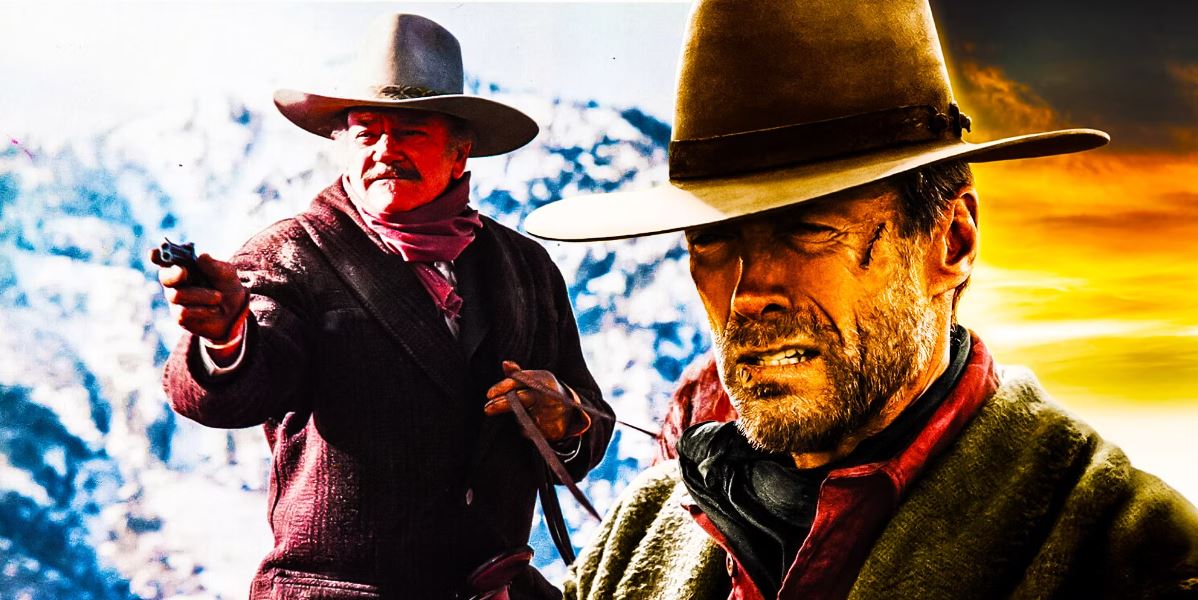The two are classic Westerns in their own right, though not at all easy to compare because of the structure of each, despite the similar basis of both films:
Wayne’s, The Shootist, is a bit of a forgotten masterpiece, made at the end of the Golden Era of Western movies.
Unforgiven is more of an echoing back to that great Western film period. With a number of those scenic and wide open shots so common place in the genre.
And more so, Unforgiven is an inquisition of Eastwood’s Man-With-No-Name and antihero cowboys of the late 1960’s and early 1970’s.
We have, in William Munny, the answer to, “Whatever happened to that guy?” for any one of Eastwood’s previous outlaw renditions.
The Shootist (1976)

Deliberately paced and without the trademark panoramic shots of so many of Wayne’s other Westerns. The Shootist could have been performed as a stage play, so character- and dialogue-driven is it. It shined the traditional light of the white-hat one last time on the tough. But honorable cowboy/outlaw that Wayne portrayed for fifty years.
Unforgiven is much more contemporary. It’s really a modern commentary on good and evil, violence as a sentence of judgement, and redemption lost. It’s about how an outlaw-turned-failing-homesteader, William Munny. Lets go of his scruples to take up his gun again for hire. To bring death upon two men as a last means of obtaining financial security for himself and his two children.
This, despite his dead wife’s wish that Munny leave his past behind, a wish Munny refuses to honor. Though he still clearly feels the influence of his wife from beyond the grave.
Both Wayne and Eastwood had a great deal of control over each film

Wayne was technically only the star of The Shootist, but behind the scenes had creative control over key character actors. And the script as it pertained to his character. Eastwood directed and starred in Unforgiven, so his control was total.
In The Shootist, J.B. Books was originally supposed to shoot another gunfighter in the back. And then be shot dead by Ron Howard’s character, Gillom. Wayne changed the script to relieve Gillom of that responsibility. He also famously refused to shoot another man in the back on screen, claiming never to have done so before. And wasn’t about to start now.
William Munny, on the other hand, has no problem lying hidden in wait to shoot one man involved in the disfiguring of a prostitute in Big Whiskey, a saloon town run by a ruthless sheriff (played by the venerable Gene Hackman.)
Books is portrayed as an honorable gunfighter, inferring that he never wronged another man. And insinuating he had only ever used his gun when his life depended on it. He is willing to teach Gillom how to shoot. But instructs him to use a gun only as a last resort, again suggesting Books never used a gun for anything but self-defense.
Conversely, Will Munny is the brutal, callous outlaw, who makes no apologies for having murdered innocents at various times throughout his life. In point of fact, he takes the job of killing the two men only for the money. Despite later showing some degree of compassion to the damaged girl later in the story.
“I’ve killed women and children. I’ve killed everything that walks or crawls at one time or another. And I’m here to kill you, Little Bill, for what you done to Ned.” (William Munny)
Unforgiven (1992)

Will Munny is haunted by his sins, with the people he’s killed appearing as ghosts and monsters in his dreams. Notably, and something that gets almost universally missed is, the man Will shoots with Ned’s Spencer rifle isn’t even guilty of harming the scarred prostitute.
Books is haunted as well, though not for his own actions. But the acts of other people who want to profit from his demise. Even the woman he loves wants only to make of his death a nest-egg for her retirement. Books is the hero beaten down by years of doing the right thing. But for little or no reward other than his own survival and the benefit of others.
The films are very firmly and unapologetically reflections of each star’s standard on-screen persona. J.B. Books and Will Munny are each whom we had some time ago come to expect of both Wayne and Eastwood — the hero and the antihero.
J.B. Books would have considered setting a man up to be shot. Without giving him a chance to defend himself, the dishonorable act of a coward.
Will Munny would have shot Books in the back under any given circumstances. And not given a damn what Books thought about honor or cowards.
